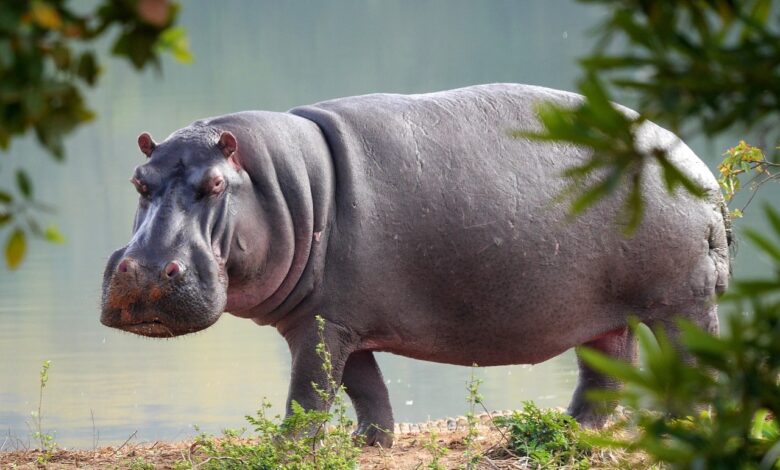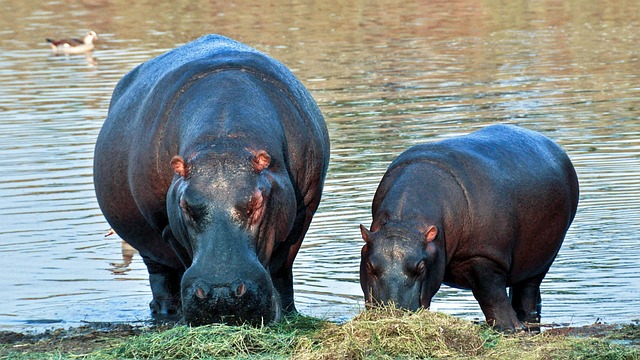Hippopotamus Wonders Unveiled: A Deep Dive into Behavior, Habitat, and Conservation Efforts

The hippopotamus, often hailed as one of the most fascinating creatures in the animal kingdom, holds a unique place in both African ecosystems and the hearts of wildlife enthusiasts. In this exploration, we delve into the depths of the hippopotamus’s existence, covering everything from its scientific classification to its behavior, habitat, and role in maintaining the ecological balance.
Table of Contents
Scientific Name
The hippopotamus, scientifically known as Hippopotamus amphibius, belongs to the family Hippopotamidae. This hefty herbivore is a true marvel of nature, with distinct characteristics that set it apart.
Types of hippopotamus
While there is only one living species of hippopotamus, Hippopotamus amphibius, they can be categorized based on their geographical distribution. Subspecies such as the river hippopotamus and the pygmy hippopotamus showcase variations in size and habitat preferences.
Evolution
The evolutionary journey of the hippopotamus traces back millions of years. Fossil evidence indicates that these colossal mammals share a common ancestry with cetaceans, including whales and dolphins. Over time, they have adapted to a semi-aquatic lifestyle, becoming the behemoths we recognize today.
Behavior
Hippopotamuses are known for their semi-aquatic nature, spending significant time in rivers and lakes. Despite their hefty appearance, they are surprisingly agile in water, showcasing remarkable swimming abilities. Their behavior is characterized by social interactions, with groups, or pods, forming to navigate their complex environment.
Habitat
Natural Habitat: Sub-Saharan Africa
Hippopotamuses thrive in various aquatic habitats, including rivers, lakes, and swamps. They are primarily found in sub-Saharan Africa, where water sources are abundant. These creatures are adept at both terrestrial and aquatic living, often submerging themselves for extended periods to escape the heat and potential predators.

Diet
Hippopotamuses are herbivores with a voracious appetite for vegetation. Despite their large size, their diet consists mainly of grass. Their massive jaws and powerful teeth enable them to graze on a variety of plant species, playing a vital role in controlling vegetation growth around water bodies.
Predators and Threats
While adult hippos are formidable and have few natural predators, they face threats from human activities. Habitat loss due to urbanization, hunting for their ivory-like canine teeth, and conflicts with humans have led to a decline in their populations. Additionally, young hippos can fall victim to predators like lions and crocodiles.
Reproduction, Babies, and Lifespan
Hippos are known for their fascinating mating rituals. Males showcase dominance through vocalizations, displays, and combat. The gestation period for females is around eight months, after which a single calf is born. Mothers are fiercely protective of their young, and the calves remain close for several months.
In the wild, hippos generally live to be around 40-50 years old. Their longevity is attributed to their robust build, adaptation to both land and water and the absence of natural predators in adulthood.
Population
Hippopotamus populations have faced declines in recent decades due to various threats. Conservation efforts are crucial to ensuring the continued survival of these magnificent creatures. Estimating their exact numbers in the wild remains a challenging task, emphasizing the importance of ongoing research and conservation initiatives.
Conclusion
The hippopotamus is a remarkable creature that plays a vital role in the ecosystems it inhabits. From their semi-aquatic lifestyle to their intricate social behaviors, hippos continue to captivate our imaginations and highlight the importance of conservation efforts to preserve these extraordinary beings.
FAQs
- Are hippos aggressive?
Yes, hippos are considered one of the most aggressive animals in Africa. They are known to be territorial and can become highly aggressive, especially during the mating season or when protecting their young.
- Can hippos swim?
Despite their massive size, hippos are excellent swimmers. They can hold their breath for several minutes and navigate through water with surprising agility.
- Do hippos eat meat?
No, hippos are herbivores, and their diet consists mainly of grass. They are not carnivorous and do not actively hunt or consume meat.
- How fast can hippos run?
Despite their bulky appearance, hippos can reach speeds of up to 20 miles per hour (32 kilometers per hour) on land. They are deceptively fast and agile, particularly when threatened.
- What is the biggest threat to hippopotamuses?
Human activities pose the most significant threat to hippopotamus populations. Habitat loss, hunting, and conflicts with humans are major factors contributing to their decline.


